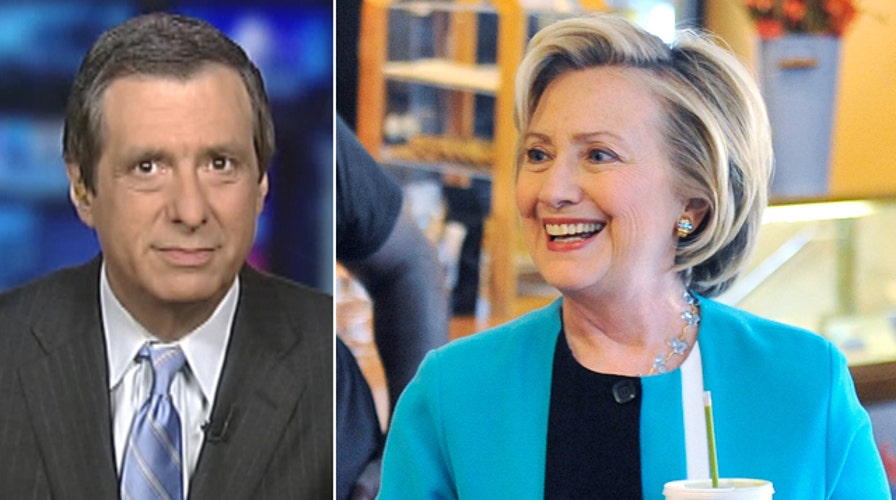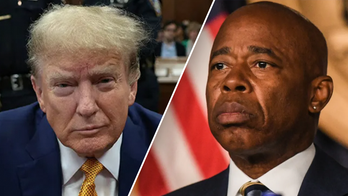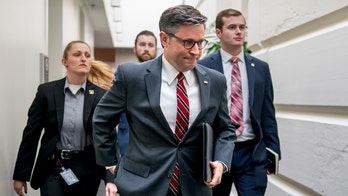Kurtz: Is Clinton no longer inevitable?
'Media Buzz' host looks at Hillary Clinton's recent campaign strength
A new campaign story line emerged yesterday that is not primarily about Donald Trump.
It is that the Trump surge is obscuring major problems for Hillary Clinton.
Hillary, like the other 15 Republican candidates, hasn’t been in the news much since we plunged into the era of All Trump All the Time. So there’s a general assumption in the media that she’s cruising to the Democratic nomination (despite Bernie’s crowds) and will be a formidable opponent for whatever Republican emerges from the demolition derby.
But a new Quinnipiac poll is calling that into question.
Some obvious caveats: It’s just one poll. It’s just three swing states. It’s early. Sometimes these snapshots are off, as the Clinton camp contends (although this one is driving the day’s media coverage).
But Hillary’s favorability rating appears way down for someone with so many advantages in the Democratic contest. And so, by the way, is Trump’s.
First, the numbers: Hillary’s fav/unfav numbers are 35/56 percent in Colorado, 33/56 percent in Iowa and 41/50 in Virginia. What’s more, a majority say she is not honest and trustworthy, and does not care about their needs and problems.
And in each of those states, she loses a matchup to Jeb Bush, Scott Walker or Marco Rubio.
What explains this?
I do think the private email and Clinton Foundation controversies took a toll, although there hasn’t been new revelations on either of those fronts.
Chuck Todd said on MSNBC that maybe Hillary isn’t wearing well—but with her limited media presence, she hasn’t constantly been in our faces.
One problem, in my view, is that there remains a remote and overly scripted feel to the Clinton campaign. After I reported that Hillary was going to be more open with the media, she took some questions at an event and did the interview with CNN’s Brianna Keilar—and that was about it.
Hillary did take a bunch of questions on Facebook, which is good, but you just don’t get the feeling that she’s plunging into things with voters and with journalists—and that carries the dreaded whiff of inevitability.
One mitigating factor is that the general election is a collection of state contests, and even if Hillary is weak in those states, she would start out with the Democrats’ usual Electoral College advantage.
Still, the poll led to some television chatter about whether Joe Biden will belatedly jump into the race, but that still seems unlikely.
As for The Donald, the Quinnipiac survey shows him with the worst fav/unfav of any candidate: 31/58 percent in Colorado; 32/57 in Iowa, and 32/61 in Virginia.
So even as Trump is the top choice among Republicans nationally, his divisive rhetoric is costing him among registered voters in the three swing states. As I’ve been saying, his greatest strength (a tough, in-your-face approach) is also his greatest weakness.
At the same time, Trump dramatically turned his numbers around after jumping into the race. He hasn’t campaigned in Colorado or Virginia. So he has the ability to move public opinion. So, by the way, does Hillary. Trump told Anderson Cooper he can change the numbers: “Every time people listen to me, all of a sudden it becomes very favorable.”
They could hardly be more different, these two, though it’s worth noting that Trump was supportive of Hillary back when he needed her help and was more liberal in his views, but now calls her the worst secretary of State ever. He’s throwing punches right and left, while she’s tiptoeing through a cautious campaign.
I don’t see Trump changing his bombastic style. But perhaps Hillary will decide to roll up her sleeves and try to win over some voters who, for the moment at least, don’t particularly like or trust her.





